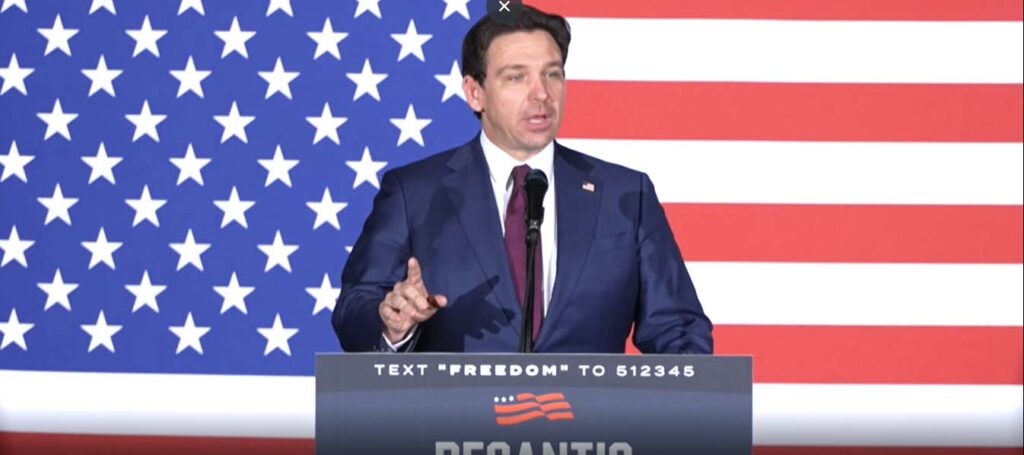Do you know where Ron DeSantis went wrong? For us election 2024
Striding across a stage adorned with flags amid cheers, Ron DeSantis vowed a “Great American Comeback” to his supporters when he launched his presidential campaign last May

However, seven months later, the man dubbed "Trump 2.0" and "Trump without the baggage" has withdrawn from the White House race. His decision was accompanied by an acknowledgment that there is no "clear path to victory" against the formidable frontrunner for the Republican nomination.
The question arises: what led to the unraveling of the once-political rock star, Florida governor Ron DeSantis, celebrated not long ago for his battle against "woke ideology" and a commendable track record in office?
Us Election News 2024 updates
1. “DeSantis Exits Presidential Race, Throws Support Behind Trump”
2. “Ron DeSantis Withdraws from Presidential Race, Endorses Trump”
3. “Turning Tides: DeSantis Drops Out of Presidential Bid, Backs Trump”
4. “In a Surprising Move, DeSantis Bows Out of Presidential Race, Supports Trump”
5. “New Hampshire Primary: Key Factors to Monitor After DeSantis’ Exit from the Presidential Race”
The candidate himself faced challenges, marked by perceived charisma deficits and awkward interactions with voters. The campaign also encountered issues. However, the primary reason for his downfall was the formidable opponent he faced – Donald Trump.
Matthew Bartlett, a Republican strategist from New Hampshire, highlighted the difficulty of competing against a figure who commanded steadfast support. According to Bartlett, Trump had become not just a political but even a personal identity for his followers over nearly a decade.
Reflecting on the campaign, experts noted the near-impossibility for a relative newcomer to navigate the national stage successfully. DeSantis found himself essentially running against an incumbent, with the hurdles of established name recognition, abundant financial resources, and a dedicated voter base.
Twelve months ago, amidst the unfolding race for the White House, the dynamics appeared different. In early 2023, Ron DeSantis posed a tangible threat to Donald Trump. At that point, with only the former president officially in the running, DeSantis held around 35% in polls, positioned within striking distance of his rival.

It is in the mind of the citizens regarding the 2024 elections USA
Buoyed by a record re-election as Florida governor in the previous November, DeSantis enjoyed momentum while Trump faced criticism for the Republicans’ lackluster midterm performance. However, this zenith became the turning point for the DeSantis campaign.
When DeSantis formally announced his White House bid in May, during an interview with Elon Musk marred by technical glitches, his poll numbers had dwindled to approximately 20%. Meanwhile, Trump’s support had surged above 50%. Strategists attribute this decline to the delayed official launch, which not only squandered valuable time but also provided Trump an opportunity to reshape his image as a political outsider amid the media frenzy surrounding his legal challenges.
“The DeSantis campaign started pretty late, raised a ton of money obviously,” remarked David Kochel, a seasoned Iowa Republican strategist.
While DeSantis may have harbored hopes that Trump’s legal issues would erode his support, he refrained from criticizing Trump and often echoed his rival’s claims of being unfairly targeted. Despite initially attempting not to offend Trump, the former president showed no such restraint, resorting to nicknames like “Meatball Ron” and “Ron DeSanctimonious.”
And also know more information on US elections
Ron DeSantis faced a unique challenge as he entered the political arena against Donald Trump, who had proven his dominance over every Republican rival since 2015. Notably, DeSantis chose to position himself to the right of Trump, a strategy not adopted by many in the past.
Unlike Trump, DeSantis primarily emphasized culture wars rather than economic issues, which were top concerns for voters. The more moderate lane in the race was occupied by figures like Nikki Haley.
As DeSantis gained national prominence, his limitations as a candidate became apparent, particularly when compared to Trump’s larger-than-life persona. Observers noted his perceived awkwardness, especially during public appearances. Mary Civiello, an executive communications coach and body language expert, highlighted this aspect, stating that DeSantis appeared to approach public engagements as something he had to do rather than a natural inclination. The discomfort was particularly evident in states like Iowa and New Hampshire, where retail politics and personal connections are crucial.
Even with a significant focus on Iowa, DeSantis struggled to win over voters, narrowly securing support compared to Nikki Haley. This dynamic underscored the challenge of connecting with voters in a landscape where personal engagement and relatability play vital roles.
Despite Ron DeSantis securing a second-place finish in Iowa on January 15, narrowly surpassing Nikki Haley, the campaign viewed it as a positive development. Supporters at the caucus night watch party in West Des Moines celebrated the result with chants of “Ron!” and waving banners. In interviews, they expressed confidence in DeSantis as a strong alternative to President Trump, anticipating support to coalesce around him in upcoming primaries.
However, by suspending his campaign and endorsing Trump before the New Hampshire and South Carolina primaries, DeSantis effectively withdrew from the race. This strategic move was seen as a measure to avoid jeopardizing his standing with Trump’s dedicated followers.
At 45 years old, DeSantis recognizes that this is not the end of his political journey. Some of his supporters, like Jack Figge, were already looking ahead to the future. Despite the underwhelming Iowa result, Figge expressed optimism for DeSantis in 2028, emphasizing that DeSantis remained his choice for future leadership.
